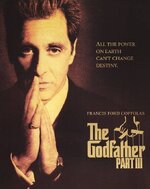I think it might even be worth rewatching the first one before you jump into the second. It's something I've done with many of what became my favorite films. Taxi Driver, Rocky, Godfather. First time I watched Taxi Driver, I watched it again a day later. Great films get better the more you watch them.
Godfather one is intentionally misdirecting for newcomers. Most people go into the film thinking it's about Marlon Brando's character when it's actually about Al Pacino's, who feels like a side character for most of the film. For that reason, you might consider a rewatch to solidify your thoughts on it.
The restaurant scene in The Godfather is pivotal to the last season of The Sopranos. It gets referenced over and over again. Maybe I'll make a post about it on The Sopranos thread.
View attachment 15564
Very interesting post. I will take note - thank you!
I think after watching so many great TV shows over the years it's easy to see how much is borrowed from the greats. It really is a revelation and adds another layer. When I first watched Breaking Bad i mentioned how they stole certain scene narratives or style from The Sopranos. Not a bad thing, just something you notice. So forgive me I will have a modern lens interpreting it.
Interesting your point about Brando. The set up of Pacino late to the wedding and Brando constantly asking for him (also being the war hero) I felt was not really unexpected but justified and made Pacino's time in Sicily such a great balance.
(Re: Sopranos -Tony's visit to Naples and Furio's forbidden desire with Carmela is a great nod to Pacino's time in Sicily)
Anyway, you're right, I should probably watch again but it took me this long I need to hurry things up. I've never seen Jaws or Taxi Driver but it's Christmas so we'll see how we go
Last edited:

